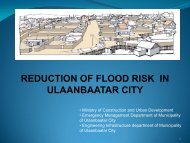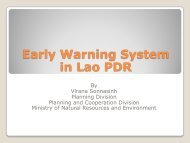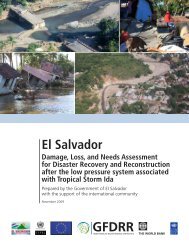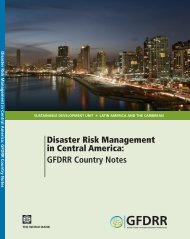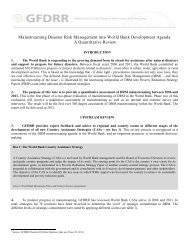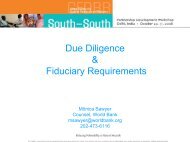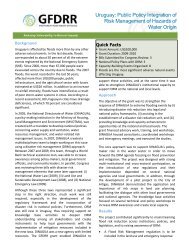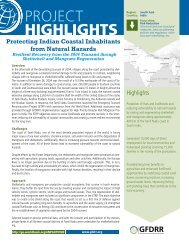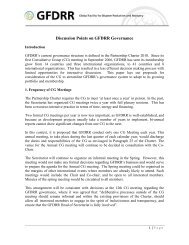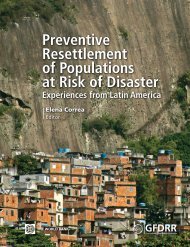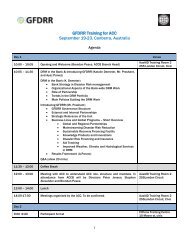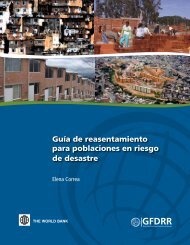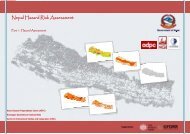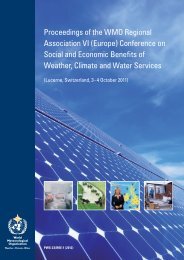Rapid Assessment for Resilient Recovery and ... - GFDRR
Rapid Assessment for Resilient Recovery and ... - GFDRR
Rapid Assessment for Resilient Recovery and ... - GFDRR
Create successful ePaper yourself
Turn your PDF publications into a flip-book with our unique Google optimized e-Paper software.
quality sustainability, assuming that sustainable management across all aspects of<br />
the resource will then follow. Australia had a water ministerial level council, supported<br />
by a ‘St<strong>and</strong>ing Committee’ of high-level officials during its ‘water development’<br />
phase, <strong>and</strong> has exp<strong>and</strong>ed the council to embrace all aspects of natural resource<br />
management now that it is in a management rather than a development phase.<br />
Separating bulk water supply from resource management. Separating bulk water<br />
services from resource management responsibilities is almost a universal prerequisite<br />
<strong>for</strong> achieving efficiencies <strong>and</strong> accountability within the water sector. The UK, France,<br />
Spain, USA <strong>and</strong> Australia have very strong separation. In Thail<strong>and</strong>, much of this<br />
separation has already occurred but it is not underpinned with a strong accountability<br />
or an adequate, integrated legislative framework or comprehensive water law. In the<br />
case of surface water supply, <strong>for</strong> example, metropolitan Bangkok is supplied water by<br />
the Bangkok Metropolitan Authority (BMA), but the supply needs of the BMA is<br />
determined independently of the needs of other consumptive users. The Royal<br />
Irrigation Department (RID) fulfills an irrigation development, supply <strong>and</strong> management<br />
function, but also undertakes some roles of the ‘resource manager’. However, there<br />
is no abstraction license issued to the BMA (as RID does not have the role <strong>for</strong> this)<br />
<strong>and</strong> hence the BMA does not have to be legally accountable in how it takes <strong>and</strong> uses<br />
water. It does however, work within the overall water allocation plan developed in<br />
association between RID <strong>and</strong> the Electricity Generating Authority of Thail<strong>and</strong> (EGAT).<br />
Separating policy from resource management. Thail<strong>and</strong> has a host of policies<br />
concerning water resources, natural resources, <strong>and</strong> the environment that have been<br />
adopted at various levels of government (Prime Minister’s Office, parliament,<br />
ministries <strong>and</strong> departments). Furthermore, the policy-making process is independent<br />
of the law <strong>and</strong> regulation making-process, which is separated from the process of<br />
<strong>for</strong>ming annual work <strong>and</strong> budget programs by the implementing agencies. In theory,<br />
Thail<strong>and</strong> has a reasonable set of general water <strong>and</strong> related resource policies that are<br />
directed toward integrated water resources management, strategic planning,<br />
sustainable development <strong>and</strong> environmental protection. However, there is no<br />
systematic <strong>and</strong> uni<strong>for</strong>m means of either establishing or implementing policies, in<br />
relation to the legal <strong>and</strong> organizational frameworks <strong>and</strong> the annual work programs<br />
<strong>and</strong> budgets of the implementing agencies. Thus in theory the mechanism <strong>for</strong> policy,<br />
law <strong>and</strong> action program development seems well entrenched, but in reality it lacks a<br />
sufficient process to correlate <strong>and</strong> co-ordinate the implementation of policy, law <strong>and</strong><br />
action plan, as well as a clear distinction between authority, responsibility <strong>and</strong> accountability.<br />
This being is the situation in Thail<strong>and</strong> generally, <strong>and</strong> in the Chao Phraya<br />
River Basin specifically, policy should be developed <strong>and</strong> its implementation monitored<br />
by a separate unit to that which undertakes a broader resource<br />
management function. A policy unit should develop water-planning guidelines that<br />
reflect national goals <strong>and</strong> aspirations, <strong>and</strong> then the resource manager should do the<br />
planning to comply with these guidelines.<br />
The separation of st<strong>and</strong>ard setting from resources management is evident in most<br />
developed countries. For example, an environmental agency can develop the water<br />
quality objectives <strong>and</strong> st<strong>and</strong>ards while the resource manager follows a variety of<br />
strategies to manage those st<strong>and</strong>ards. The most important issue in st<strong>and</strong>ard setting<br />
is <strong>for</strong> water quantity <strong>and</strong> quality monitoring <strong>and</strong> the issuing of water extraction<br />
licenses <strong>and</strong> pollution permits to be carried out in the one agency. In this way, a<br />
whole range of integrated strategies covering quantity <strong>and</strong> quality can be developed<br />
to attempt to meet st<strong>and</strong>ards. Separating the issuing of extraction licenses <strong>and</strong><br />
pollution permits into two agencies inhibits the development of these integrated<br />
strategies. If the water quality st<strong>and</strong>ard setting <strong>and</strong> the pollution permitting functions<br />
are together, there will be criticism that a ‘soft’ st<strong>and</strong>ard is set by the environmental<br />
agency to allow a high level of per<strong>for</strong>mance in meeting the st<strong>and</strong>ard while issuing<br />
permits.<br />
A-46 THAI FLOOD 2011 RAPID ASSESSMENT FOR RESILIENT RECOVERY AND RECONSTRUCTION PLANNING



